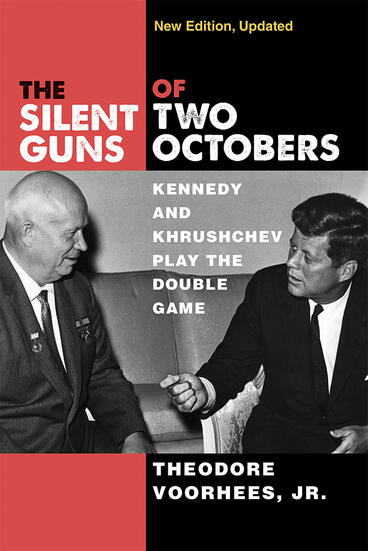The Silent Guns of Two Octobers
Kennedy and Khrushchev Play the Double Game
New Edition, Updated
Far from the brink
Description
The Silent Guns of Two Octobers uses new as well as previously under-appreciated documentary evidence to link the Cuban Missile Crisis to the Checkpoint Charlie tank standoff to achieve the impossible—craft a new, thoughtful, original analysis of a political showdown everyone thought they knew everything about. Ultimately the book concludes that much of the Cold War rhetoric the leaders employed was mere posturing; in reality neither had any intention of starting a nuclear war. Theodore Voorhees reexamines Khrushchev’s and Kennedy’s leadership, decision, and rhetoric in light of the new documentary evidence available. Voorhees examines the impact of John F. Kennedy's domestic political concerns about his upcoming first midterm elections on his handling of the Cuban Missile Crisis through his use of back-channel dealings with Khrushchev during the lead-up to the crisis and in the closing days when the two leaders managed to reach a settlement.
Theodore Voorhees, Jr. is Senior Counsel at Covington & Burling LLP.
Reviews
"Theodore Voorhees, Jr. has written a boldly original and impressively researched account of how events, fortunately, did turn out in October 1962."
- Sheldon Stern
—Sheldon Stern, Washington Decoded
"Theodore Voorhees, in his brilliant but under-recognized book The Silent Guns of Two Octobers: Kennedy and Khrushchev Play the Double Game, argues convincingly that there was never any real danger of war, since Kennedy and Khrushchev were equally determined to avoid one, and both were so dominant domestically that they could ensure it didn’t happen. This conclusion is unlikely to disturb the consensus among historians that the world was on the brink of nuclear war."
- Andrew Cockburn
—Andrew Cockburn in Spoils of War
“In the vast and growing body of literature on the Cuban Missile Crisis of 1962, when the installation of Soviet warheads on the island elicited fears of nuclear war, there is barely a mention of the influence that US domestic politics may have had on the course of events. Theodore Voorhees’s study is different . . .Voorhees argues convincingly that there was never any real danger of war, since Kennedy and Khrushchev were equally determined to avoid one, and both were so dominant domestically that they could ensure it didn’t happen.”
- Andrew Cockburn
—London Review of Books
"The Silent Guns offers some new findings and stimulating arguments on the nexus between domestic politics and diplomacy, the inner workings of the back-channel diplomacy between Kennedy and Khrushchev, Kennedy’s fallback to avoid nuclear war, and the problem of how close the Cuban crisis came to nuclear apocalypse. With these insights, the book contributes to further understanding of the Cuban Missile Crisis."
- Toshihiko Aono
—Diplomacy & Statecraft
News, Reviews, Interviews
Read: Featured on "The Best Books on the Cuban Missile Crisis since the opening of JFK's White House tape recordings" | 12/16/2021
Read: "Spats about Ports in Sri Lanka: The Bigger Picture" featured a section on The Silent Guns of Two Octobers | 09/10/2021
Watch: "Theodore Voorhees: Kennedy and Krushchev Play the Double Game Over Berlin and Cuba" at the Commonwealth Club | 10/12/2020

